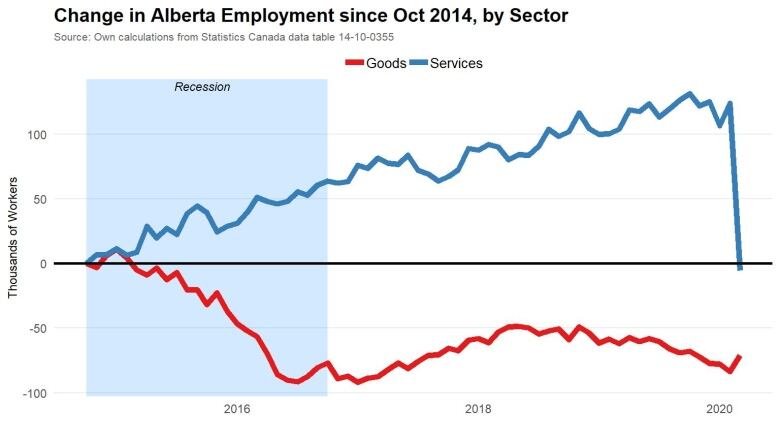COVID-19 obliterates 117,000 Albertans' jobs, hitting young, female service workers hardest
New Statistics Canada data offers a snapshot of the pandemic's effects, and it's only the beginning

We knew the numbers would be bad and, on Thursday, we got to see justhowbad.
Roughly 117,000 Albertans were among the one million Canadians who lost their jobs in March, in the wake of the widescale economic shutdown due to the COVID-19 pandemic.
"We were anticipating losses of this magnitude and we saw similar developments in the United States," University of Calgary economist Trevor Tombe said of the new numbers from Statistics Canada.
"But this is just the start of the labour market disruptions," he warned.
To say these figures are unprecedented would be an understatement.
The national employment reduction in March represented about fiveper cent of the country's total labour force, Tombe noted. Prior to this, he said the worst monthly declines in recorded history came in the 1930s, during the Great Depression, and those were in the neighbourhood of 2.5 tothree per cent.
"So this five-per-cent drop is the sharpest, fastest, largest monthly decline ever," Tombe said.
Overall, Alberta's employment declined roughly on par with the national average.
But acloser look at the data reveals how young people in particular have been affeced by this unusual economic situation,where large swaths of the economy have beendeliberately shut down.
Among Albertans over the age of 25, the employment decline was around three per cent. That's no small thing; it's still Depression-era stuff.
But the job losses among young people especially young women have been truly staggering.
There were roughly 285,000 Albertans under the age of 25 who were working in February, according to Statistics Canada. That fell to roughly 231,000 in March, a decline of 18.9 per cent.
Amongyoung female workers, in particular, the decline was even larger: 23.4 per cent or roughly34,000 of them.
These stunning numbers are related to the types of jobs that have evaporated during the public-health crisis.
Tombe noted that losses in service-sector jobs effectively accounted for Alberta's entire employment decline in March.
Think of all those restaurants that have closed.
All the retail shops that have shuttered or moved to online-only sales.
The cafes and bars that are no longer able to serve customers.
Younger people tend to make up a disproportionate number of the workers in these types of roles, which were the first to be hit by the pandemic countermeasures.
Kelly Louch was working as a bartender at an Original Joe's restaurant in Calgary, until the restaurant shut down due to the pandemic. She said almost all the staff were laid off.
At age 28, she said she's more financially secure than many of her friends and peers who have also lost work.
"We have so many group chats going on and people are messaging every day and stressed out," she said.
"In the industry, it's really hard to save money because it's so inconsistent. So there will be good months and bad months, so if you save one month you have to use it the next month. So I think a lot of people went into this with no savings."

If there's a silver lining in all this, it's that what we're experiencing is by no means a normal recession.
"This decline in employment is very different than other recessions in the past, because this one is a public health measure, where governments are shutting down by choice," Tombe said.
Governments are also"rolling out large-scale income support programs to bridge people and businesses through the crisis," he noted.
"So ideally, of course, depending on how effective those measures are and how long this lasts, we will then start to relax these social-distancing restrictions when the health crisis passes and then we will see increases in activity and employment that are equally unprecedented," Tombe said.
"So this we shouldn't think of it as a normal recession. This is very, very different."
Mass layoffs, but hopefully temporary
Cassandra Heaslip, general manager of Craft Beer Market in downtown Calgary, said the bar had to lay off 125 employees when it closed due to the pandemic.
But she hopes the layoffs will only be on a temporary basis and everyone will be rehired once the public-health restrictions are eventually lifted.
"We totally believe in our people and we want to make sure they come right back as soon as we're able to open these doors," she said.
Realistically, though, she said that likely won't be until later in the summer. While it's impossible to predict, she said the bar is eyeing August for a potential reopening.
"If it's safe and the government says that we can open sooner, we're ready to go at any time," she said."But at the same time we're trying to be honest with our team and not give any false hope to them, either."
And in the immediate term, at least, Tombe believes things will likely get worse before they get better.
Alberta faces a 'twin challenge'
Tombe expects there are further economic effects that may have already begun but have yet to show up in the data.
"This March report covered just that week of March 15th. So,to get a full picture of what COVID means for employment and jobs in Canada, we're going to have to wait until the next LabourForce Survey next month," he said.
"Almost surely we're going to see that employment losses were larger than what are reflected in this report."
He said Alberta, in particular, is also dealing with the "twin challenge" of public health measures and rock-bottom oil prices that are projected to remain low for some time.
"The implications of low oil prices and the reduced activity in that sector was not evident in this report at all."
With files from Rick Donkers and Lucie Edwardson












_(720p).jpg)


 OFFICIAL HD MUSIC VIDEO.jpg)
.jpg)



























































































